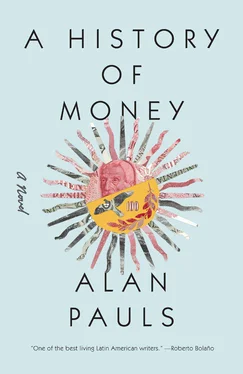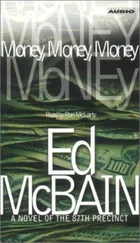In less than a minute — the time it takes the driver to pull away, maneuver around the car in front, and turn onto the road under the hostile gaze of the ravens from the funeral parlor — they’ve cleared up the confusion about the cars. No, the car isn’t part of the procession: it was just parked where it shouldn’t have been. It’s the cab the stranger picked up at Ezeiza Airport, which he just flew into from Brazil, heading straight to his father’s funeral and now to the cemetery. No, there’s no need to get out. On the contrary: it’s an honor for the stranger to share this journey with him (sneeze), sad as it is. He smiles at the stranger dopily. They’re driving down a boulevard lined with auto-parts stores. The driver steers almost without touching the wheel, giving it the merest grazes with his fingertips, like a gloved magician or someone who specializes in treating infectious diseases, and seems to shift gears with nothing but a gesture, not making any contact with the stick. “This is Avenida Warnes, isn’t it?” says the stranger, admiring the display cases full of tires, the Formula One streamers in the windows, the signs tattooed with the names of car manufacturers, and the blow-up dolls waving to attract clients. He hasn’t come to Buenos Aires for twenty-two years, and (sigh) he wasn’t able to meet up with his father that time either. He offers him a soft, sweaty hand that’s wearing a wristband made of small, multicolored beads. “Beimar,” he says. “Milo Beimar.”
“Beimar … Beimar …,” his mother repeats, as though turning over a suspicious mouthful. The name means nothing to her. She can picture him at the funeral: his elegant, wellcut, expensive suit and his mafioso’s black shirt and tie, and that carrot-orange tan that looks like it came out of a bottle of Sapolán Ferrini. But his face is like a white wall. She remembers wondering who he was, but she wondered that about 90 percent of the faces she came across at the funeral. She didn’t recognize anyone, and that didn’t surprise her. It was like that even when she was married to his father. A new face every day, people appearing and then disappearing without a trace, voices calling, asking for him, and then hanging up, never to call again. She never even has time to register their names, so she can’t ask him about them. What happened to Barbat? And Desrets? Don’t you see Desrets anymore? They’re like imaginary friends. At a certain point she starts to think they’re all extras, bit players that his father, who’s always been so sensitive to what other people think, hires to simulate a social life, a network varied enough to create the impression that he’s a man of the world — an impression he can’t live without — in just the same way that his monogrammed shirts and cufflinks claim a lineage he doesn’t have.
He likes this idea of his mother’s. It’s tortuous and precise, with just the amount of spite any idea needs in order to go out into the world and hit its mark. But bit player or otherwise, Beimar was and is somebody. For a start, he was the Man Who Owed His Father Money — and the moment he says it, he sees the title printed on a cheap horror-film poster, in big red letters that flicker like flames — or (a subtle change in viewpoint, or genre, to children’s horror) the Man His Father Goes to See Every Night in Rio de Janeiro, Leaving Him Waiting Up Alone at Hotel Gloria. To sum up the fragmented service record that Sapolán itemizes through his sneezes between Avenida Juan B. Justo and a cemetery on the outskirts of the city in Ingeniero Maschwitz, which has no tombs or headstones and looks like a golf course, a pristine carpet of grass so green and smooth that there’s no earth on Earth capable of growing it: Milo Beimar, a precocious, provocative underground filmmaker, expelled for reasons of sexual rivalry — half an hour of wild sugar harvesting in the former cane capital, Tucumán province — from the tiny, secret group that captured this landscape for the first scenes of the revolutionary documentary The Hour of the Furnaces, and from Argentina on political-criminal grounds; the bearer, on boarding at Ezeiza Airport, of a flawless fake passport, a one-way ticket to Rio de Janeiro, and a suspicious handful of genuine dollars (all three things the fruits of his father’s machinations); an exile in Brazil, where he becomes a convert to the cinema of the advertising industry, drowning in money and drugs, the new drugs of the late seventies; a wreck, in the eighties, from the money and drugs of the seventies, which cost him a septum, a marriage, and all of the assets, minus what goes to his wife, acquired during ten years’ work in the advertising department at the Globo network. That’s where he is — with no job, no money, and no family, living on handouts in the maid’s quarters of the spectacular Ipanema apartment of the junior writer at the agency whose scripts he spent a decade filming — when his luck changes. One night after leaving a friend’s house (one of the few he has left besides the junior writer), completely deranged after hours spent watching TV, drinking bad beer, and smoking good Brazilian marijuana, he walks aimlessly for a few blocks (it’s a cool night, there’s a pleasant breeze blowing from the lagoon and drying his sweat, and passing from east to west in the moonless, starless sky is a Boeing 747 that will plunge headfirst into the Atlantic in the early hours of the next day), and is suddenly struck by the blood-sugar dip he was expecting later, when he was already safe and sound in his little cave at the junior writer’s place, within easy reach of the demented quantities of ice cream his host keeps in the freezer for just such occasions. His mouth is very dry, and the edges of his lips sting. In a sudden moment of synesthetic self-awareness, he sees them shining in the darkness, outlined by four very fine lines of yellow lightbulbs, which flicker like a landing strip in the middle of the night and then go out one by one, as though his lips were about to fade away. He’s dying for something sweet, and there’s no store in sight. The only thing he has on him is two sticks of the sugar-free mint gum that several pseudo-dentists with bright eyes and very taut skin have recently started to promote on TV using whiteboards, pointers, and misleading arguments written by the junior writer who’s taken him in and his underlings at the agency. Better than nothing. He puts both sticks in his mouth at once. A minute later — by which time they’ve lost all trace of their flavor — he has no craving for sweets whatsoever. His blood-sugar levels have completely stabilized. He goes to sleep. The following morning, he wakes up early, showers, and uses a public phone box — since there’s nobody less trustworthy than the junior writer — to call the lawyer who handled his divorce, to whom he owes two or three times what he owes his father, and fill him in on his nocturnal discovery. Two months later, the two of them seal an unofficial deal, in absolute secrecy, with the company that produces the sugar-free mint gum: the company transfers several million to his almost empty checking account (a sum he’s lived on ever since, is now living on, and will probably continue to live on without needing to work until he dies), and, for his part, he promises to withdraw the lawsuit claiming large-scale fraud and endangering the public health that his lawyer wrote in a morning and half of an afternoon.
And now the brilliant illumination of that toxic, hopeless night seems suddenly to be delivering a check — like a holy apparition breaking through a canopy of black clouds — which Beimar fills out with his crude handwriting, signs, rips out with a sharp, expert pull, and then hands to him in the cab on the way back from the cremation. It finished less than half an hour ago, and already he can barely remember it, as though the flames that charred his father’s body had also swallowed all trace of the ceremony. He’d go so far as to swear that it didn’t happen at all, that it was just a figment of his imagination, if it weren’t for the urn sitting next to him on the backseat of the car and the prayer card he’s holding between his thumb and index finger. How did it get there? One of the ravens must have given them out to the mourners at the end of the ceremony. He hasn’t taken his eyes off it since they left; he’s in awe of the artistic technique — it’s a retouched photo of his father, tinted with pale colors like something from a comic book or a picture from a children’s story — which softens his features and gives him the smiling bonhomie of a saint. Until he has to switch hands to take the check that Beimar hopes will settle this debt he’s had for, what, forty years now?
Читать дальше












